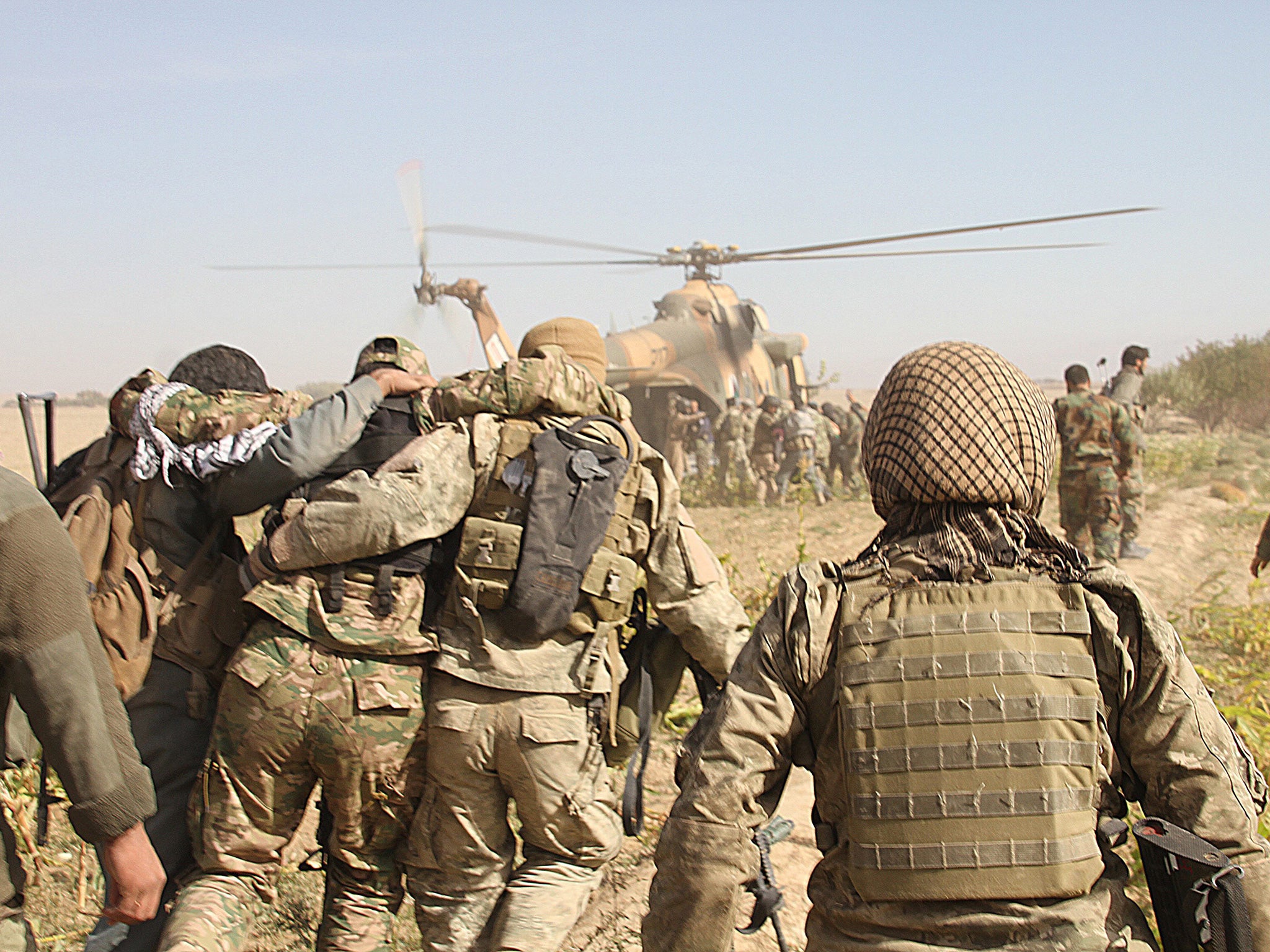Afghan alarm: ‘Why couldn’t troops fight off a few Taliban rebels?’
Locals fear that insurgents could return and will not face effective opposition

The Taliban held Kunduz for just two weeks, but the damage it has done to the credibility of security forces in the northern Afghan city could be permanent.
Though Afghan special forces are now fully entrenched in the provincial capital, residents – those who dared to return – say the threat of a Taliban comeback is still potent, and they are sceptical that Afghan authorities could do much to stop it.
“The front line is just 4km from the city,” Mahmood Kundozi, a butcher, told The Independent, sitting in a shack in the local bazaar at the centre of Kunduz. “The Taliban retreat could be a tactical ploy. It could be a move to buy time to regroup, rearm and launch an even-bigger assault.”
An air of uneasiness hangs over the bazaar, as locals throng shops selling food, and kerosene, coal and wood – the primary fuel sources for cooking, lighting and heating.
“People are stocking up on essential items. No one wants to take any chances,” said Baqi Jan, who sells coal from a shop next to Mr Kundozi’s. The Afghan government has sent troops from its elite Crisis Response Unit to the district and Mr Jan said the bolstered security forces in recent days has raised fears that the government believes a serious fight could be imminent. Meanwhile questions remain about how easily the city fell last month. “Why couldn’t thousands of Afghan soldiers in Kunduz give an effective fight to a few hundred Taliban insurgents? What were the intelligence agencies doing? Who was responsible for the fall of Kunduz?”
The street battles for the control of Kunduz have left the city in ruins. In its bid to seize control of the city, home to 300,000, the Taliban indiscriminately targeted government buildings, NGO offices, schools, shops, electricity poles and water pipelines.
“Most of the limited infrastructure the Afghan government built here in the past few years has been destroyed,” said Rahim Khan, who fled Kunduz just before the Taliban took over the city. “It will take years for these scars to heal,” he said, pointing to the ruins of government buildings in the city’s main square.
Though the authorities managed to restore electricity and the water supply within three days of regaining control of Kunduz, it will take them months to rebuild the other infrastructure.
“The Kunduz government is working from makeshift offices. The Taliban destroyed all our computers, torched files and documents. We still haven’t come to grips with the situation,” an official with the civil works department of Kunduz government told The Independent. The official spoke on condition of anonymity.
As the sun set, Kundozis rushed towards home. By 7pm, all shops were shut and streets are empty except for soldiers on patrol. “We are patrolling to send a signal to the Taliban that we are in control,” said Sergeant Abdul Matin Sulaiman Khil. “I have 150 commandoes under my command. They are now searching the city for lurking Taliban insurgents and their informers.”
As the city went quiet, sporadic machine gun and artillery fire could be heard from a distance. The firing soon becomes intense. “Some insurgents have sneaked into Zakhil,” Sergeant Khil said. Zakhil is about 1km from the city centre.
Several areas on the outskirts within Kunduz province are still in Taliban control and the Afghan forces are mounting operations to free them. But their limited victories have been symbolic. On Saturday, they recaptured key district headquarters in nearby Dasht-e-Archi, but fighting continues in civilian areas. Dasht-e-Archi, close to the border with Tajikistan, is the home of Mullah Abdul Salam, the Taliban’s shadow governor of Kunduz province.
“Most of the families are leaving the district, the fighting is heavy. Shelling, artillery and helicopter gunships make life hell,” Mohammad Jan, a Dasht-e-Archi resident, told The Independent. The province is known as the bread basket of Afghanistan and farmers say their fields have been shelled by both sides, raising fears the fighting could affect food supplies.
Meanwhile the Taliban, strengthened by its recent gains in territory and resources, has become an increasingly attractive prospect for local residents. Another Dasht-e-Archi resident, Khalid Baay, told The Independent the Taliban was recruiting from nearby villages “Mostly young people, [and] they are offering up to $500 (£323) a month,” he said. “For the last five months, the district has been controlled by the Taliban; they had their own judges, their own courts. Now we want to see what the Afghan government does.”
Join our commenting forum
Join thought-provoking conversations, follow other Independent readers and see their replies
Comments
Bookmark popover
Removed from bookmarks